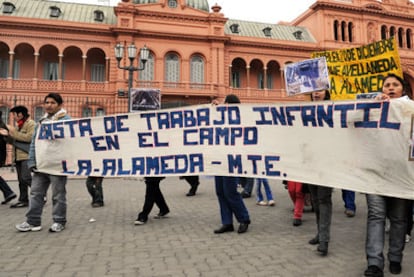Argentina probes field slave labor
Nearly 200 workers were hired under inhumane conditions, prosecutors say
Argentinean prosecutors and Labor Ministry officials are accusing the multinational grain giant Nidera of using slave labor on its farms. The complaint was filed at the end of last year against the Netherlands-based firm, which is present in 22 nations.
Nidera, which also produces seeds, fertilizers, herbicides and fungicides, denied the accusation. But the inhumane conditions that have surfaced in parts of the country's fields and in one of the most productive sectors of Argentina have sparked national outrage.
Last Wednesday Argentinean Labor Minister Carlos Tomada met with the four main organizations that group farmers and ranchers in the country. He asked them to embark on joint action to "eradicate the underground labor and slave-like conditions that justice is investigating."
But such conditions in Argentina have not only been detected in the fields, but also in sweatshops in Buenos Aires, in brothels around the country, and even in brick factories in the suburbs of the capital. In Neuquén in Patagonia, workers at the La Alameda cooperative have been denouncing degrading work conditions for some time.
About 1.3 million Latin American workers suffer under forced-labor conditions, according to the International Labour Organization (ILO).
Prosecutor Rubén Giagnorio has filed charges against seven Nidera employers for the alleged "reducing to slavery" (the legal terms in Argentina for slave labor) of 60 children and 120 adults, who come from the northern province of Santiago del Estero and were transferred to work seasonally in the municipality of San Pedro (165km north of Buenos Aires).
Prosecutors and top Ministry officials say that Nidera employers took them for 15 days without telling them how much they were going to get paid, locked them up in a farm building, and took away their identity papers.
According to the complainants, the workers slept in crowded barracks, much like a concentration camp; had no toilets, drinking water, fire extinguishers or materials for workplace safety; the electrical installations were poor; and the deductions from their salaries were insufficient to pay for work clothes and the food that an outside vendor was selling them at a higher price than in the shops.
They were even forced to pay for packets of spaghetti that carried the logo of the Ministry of Social Development in Buenos Aires, which are distributed free.
Nidera, which in Argentina is the sixth-largest exporter of grain and the number-one producer of soybeans and sunflower seeds, said in a press release that all workers were registered with Social Security; wage conditions, transportation, labor, housing, hygiene and food were provided under the conditions prescribed by law; and that none of these "services" had been deducted from the workers' pay.
The company also said the children aged 16 to 18 were able to work because they were authorized or had been accompanied by their parents.
"The charge relates to a common industry practice in which the grain companies hire temporary employees to help in the picking of hybrid maize plants," claimed Nidera, a family run Dutch-Argentinean company that is present in countries such as Brazil, Uruguay and Eastern Europe nations.

Tu suscripción se está usando en otro dispositivo
¿Quieres añadir otro usuario a tu suscripción?
Si continúas leyendo en este dispositivo, no se podrá leer en el otro.
FlechaTu suscripción se está usando en otro dispositivo y solo puedes acceder a EL PAÍS desde un dispositivo a la vez.
Si quieres compartir tu cuenta, cambia tu suscripción a la modalidad Premium, así podrás añadir otro usuario. Cada uno accederá con su propia cuenta de email, lo que os permitirá personalizar vuestra experiencia en EL PAÍS.
¿Tienes una suscripción de empresa? Accede aquí para contratar más cuentas.
En el caso de no saber quién está usando tu cuenta, te recomendamos cambiar tu contraseña aquí.
Si decides continuar compartiendo tu cuenta, este mensaje se mostrará en tu dispositivo y en el de la otra persona que está usando tu cuenta de forma indefinida, afectando a tu experiencia de lectura. Puedes consultar aquí los términos y condiciones de la suscripción digital.








































